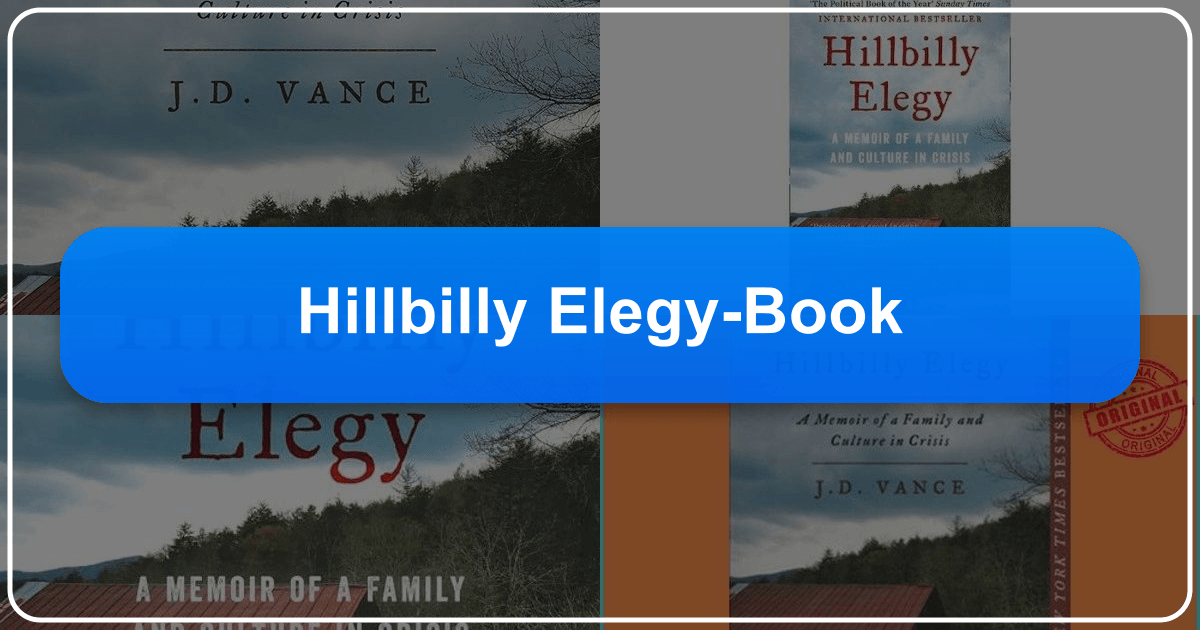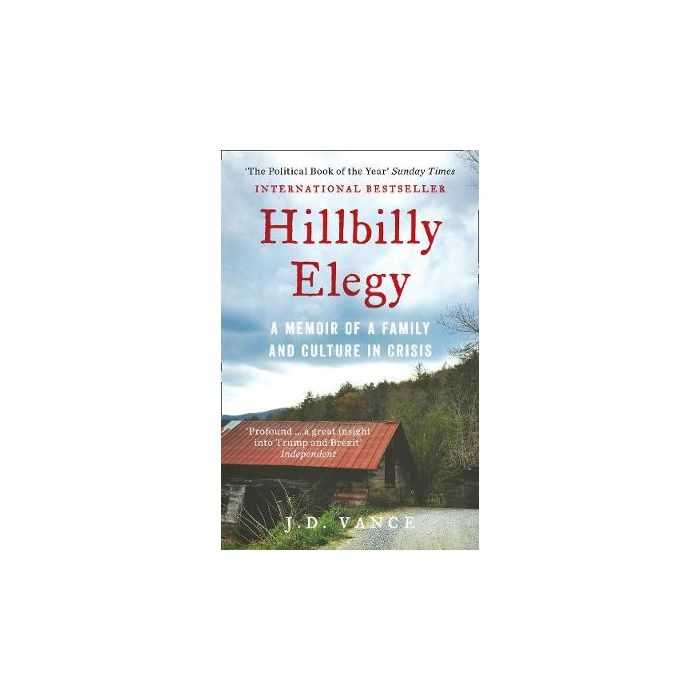Hillbilly Elegy: A Deep Dive into J.D. Vance's Memoir

J.D. Vance’s “Hillbilly Elegy: A Memoir of a Family and Culture in Crisis” is more than just a personal story; it’s a poignant exploration of the struggles faced by America’s white working class. Published in 2016, the book quickly became a bestseller, sparking widespread discussions about class, poverty, and the fading American Dream. This in-depth analysis examines “Hillbilly Elegy” through various lenses, exploring its genre, authorial style, cultural impact, and the enduring lessons it offers readers.
Genre and Literary Significance
“Hillbilly Elegy” defies simple categorization. While primarily a memoir, chronicling Vance’s personal experiences growing up in Appalachia and the Rust Belt, it also functions as a work of social commentary and cultural criticism. Vance seamlessly blends intimate narratives with insightful sociological observations, offering a rare insider’s perspective on a community often overlooked in mainstream discourse. The book’s genre-bending approach contributes significantly to its impact, resonating with a broad audience beyond those directly familiar with the experiences described. Its literary significance lies in its ability to humanize a complex social issue, prompting empathy and understanding where there was once only judgment or apathy.

A Memoir of Upward Mobility
At its core, “Hillbilly Elegy” is a powerful narrative of upward mobility. Vance’s journey from a disadvantaged background to graduating from Yale Law School is a testament to his resilience and ambition. However, the memoir doesn’t shy away from the struggles he encountered along the way. It is not a rags-to-riches tale that glosses over hardship, but rather a complex portrait of a young man grappling with generational trauma, addiction, and the systemic challenges that hinder upward mobility for many in similar circumstances. The book showcases the emotional toll of poverty, demonstrating how it deeply impacts family relationships and individual lives.
Cultural Criticism and Sociological Insight

Beyond the personal narrative, “Hillbilly Elegy” offers keen sociological insights. Vance analyzes the cultural factors contributing to the decline of the white working class, examining issues such as addiction, family dysfunction, and the erosion of traditional values. His analysis isn’t simply a condemnation but rather an attempt to understand the root causes of the problems he observed. This blend of personal experience and sociological analysis is what makes the book so compelling and thought-provoking. It invites readers to reflect on broader societal issues while connecting with Vance’s emotional journey on a deeply personal level.
J.D. Vance: Authorial Style and Inspirations

J.D. Vance’s writing style is characterized by its raw honesty, emotional depth, and insightful observations. He avoids sentimentality, opting instead for a direct and unflinching approach that makes the narrative feel authentic and relatable. Vance’s ability to incorporate humor into his often heartbreaking accounts adds another layer to his storytelling, keeping the narrative from becoming overly bleak. The reader is able to connect emotionally with the narrative due to this combination of stark realism and moments of humor.
Writing Style: A Blend of Personal and Analytical
Vance deftly weaves together personal anecdotes with insightful analyses of broader societal trends. He doesn’t simply recount his experiences; he uses them as a launching pad to explore the larger cultural forces at play. This blending of personal narrative and social commentary creates a unique and engaging reading experience that manages to be both intensely personal and broadly relevant. The book’s strength lies in this ability to connect personal experiences to larger societal issues, allowing the reader to fully understand the context of Vance’s story.
Inspirations and Influences
While Vance doesn’t explicitly state specific literary inspirations, his work reflects influences from both memoir and social commentary traditions. The book’s intimate portrayal of family relationships and personal struggles aligns it with the memoir tradition, while the insightful social commentary draws parallels to works of sociological analysis and cultural criticism. The impact of Vance’s own experiences in the Appalachian and Rust Belt communities heavily influences the storytelling style and focus of the memoir. The authenticity of the narrative is furthered by the personal connection to the subject matter.
Reading Habits, Educational Value, and Life Lessons
“Hillbilly Elegy” is not a light read; it confronts challenging themes that require careful reflection. This makes it an ideal topic for book clubs and discussions, promoting thoughtful engagement with its complex issues. Readers may benefit from engaging with the book slowly and reflectively, allowing ample time to grapple with the emotional weight of Vance’s experiences and the societal problems he addresses.
Educational Value and Key Takeaways
The book provides valuable educational insights into the complexities of poverty, addiction, and social mobility in America. It challenges common stereotypes and biases, offering readers a greater understanding of the systemic and cultural factors that contribute to these issues. The book serves as a powerful reminder of the significance of community, family, and education in breaking cycles of poverty. It highlights the impact of systemic issues on individual lives, and the importance of self-awareness and responsibility in escaping the cycle of poverty.
Life Lessons and Personal Growth
“Hillbilly Elegy” offers powerful life lessons that extend beyond its specific setting. The themes of resilience, perseverance, and the importance of personal responsibility resonate universally. The book encourages readers to confront difficult truths about themselves and society, fostering self-reflection and potentially leading to personal growth. The memoir showcases the power of human connection and the role it plays in overcoming hardship. It emphasizes the importance of family and community in breaking cycles of poverty and achieving upward mobility. The honesty and vulnerability in Vance’s narrative can inspire readers to embrace self-awareness and responsibility in their own lives.
Cultural Impact and Reception
The publication of “Hillbilly Elegy” triggered a significant cultural conversation. It became a central text in the national debate about class inequality, opioid addiction, and the struggles of rural America. The book garnered significant media attention and sparked discussions across political divides, fostering a much-needed conversation about the complexities of class and socioeconomic issues.
Literary Influence and Adaptations
The book’s success has influenced subsequent literary works exploring similar themes of class and poverty, with authors drawing inspiration from Vance’s approach to storytelling and analysis. While the book has faced its share of criticism, its impact on the literary landscape is undeniable. This has led to widespread discussion surrounding class and socioeconomic issues, which has shaped subsequent works.
Awards and Recognition
The book has not only achieved significant commercial success but also received recognition in the literary community. Though it may not have won major literary awards, its widespread popularity and impact on public discourse solidify its place as a culturally important work.
Communities and Discussions
The book generated substantial dialogue among readers, prompting book clubs, community discussions, and public forums exploring the issues it raises. This widespread discussion has contributed to greater awareness and understanding of the experiences and challenges faced by many Americans. It sparked a conversation that continues to this day, shaping ongoing debates around socio-economic issues.
Conclusion
“Hillbilly Elegy” remains a relevant and impactful work years after its publication. Its blend of personal narrative and sociological analysis offers valuable insights into the challenges faced by a significant segment of American society. The book’s enduring legacy is not only its commercial success but also its profound impact on the national conversation surrounding poverty, addiction, and the pursuit of the American Dream. Its enduring value lies in its ability to generate empathy and encourage further exploration of these complex and vital issues. The book serves as a powerful reminder of the importance of understanding, compassion, and addressing systemic issues that impact individual lives and communities.